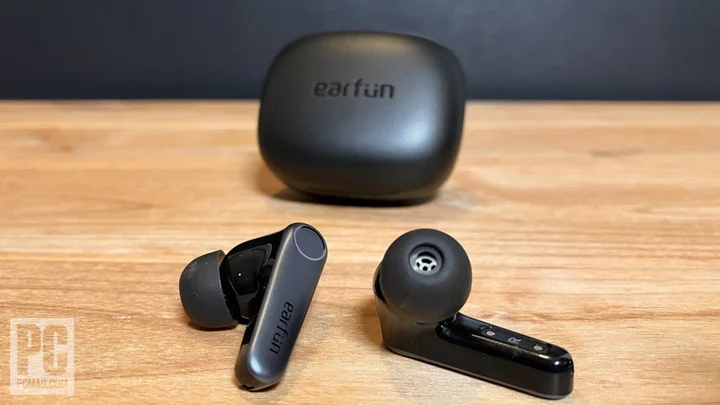Apple popularized the true wireless earbud category when it launched the original AirPods back in 2016, so it's no surprise that interest in true wireless pairs with noise cancellation has ballooned since the release of the AirPods Pro. Noise cancellation helps to block out sound around you, both passively by sealing off your ear canal and actively through specialized circuitry; the latter method is called active noise cancellation (ANC).
The good news is that you now have many excellent options across a wide range of prices. The unsurprising news is that, just as with standard Bluetooth over-ear headphones that offer noise cancellation, there are definitely some earbuds to avoid. Below, we list our current favorites for pure noise cancellation power, audio quality, and even exercise. And, further down, we explain what you need to know before you make a buying decision.
Do Noise-Cancelling Earbuds Block All Sound?
Active noise cancellation debuted in over-ear and on-ear headphones first but is now prevalent in both wired and wireless earphones. As the first word of the term suggests, active noise cancellation requires power, as opposed to passive noise reduction. Battery power feeds ANC circuitry that, using microphone signal feeds, creates a live, inverse signal of the surrounding noise. Just as a negative number added to its positive equivalent equals zero, the goal here is to offset the actual surrounding noise with inverse sound waves.
Does it work? That depends on the manufacturer and the character of the surrounding noise. Even good ANC is typically far more effective at tamping down low to mid frequencies, especially unchanging, drone-like sounds such as airplane engines and train rumble, or the whir of an AC unit. The very best ANC does the same for some higher-frequency sounds, like office chatter, keyboard clicks, and the like. But a combination of the active circuitry and an in-ear seal are most effective against these sounds.
Speaking of an in-ear seal, passive noise cancellation (or passive noise isolation or passive noise reduction) uses the physical sealing-off of the ear canal to block out surrounding sound. There are no mics or batteries involved in this method, but it is, in many ways, more effective than active noise cancellation because it helps cut back frequencies across the board. Earplugs still exist for a reason—they work.
How to Buy Wireless HeadphonesBad Noise-Cancelling Earbuds: What to Avoid
Lower-quality ANC circuitry often reproduces an audible high-frequency hiss—like white noise or tape hiss—that masks some of the higher frequencies it can’t eliminate. The easiest way to tell if this is happening is to activate the ANC in a totally quiet environment—if it seems to make the noise floor louder, it’s adding a hiss. Most pairs we test add in some degree of hiss, but the quality of the ANC dictates its prevalence.
Another aspect of low-quality ANC—especially in wireless headphones and earphones—is the difference in how music (or any audio) sounds when it is active. The ANC shouldn’t change how music sounds at all, but some models we test produce wildly different sound signatures when the ANC is on, such as more bass, more treble, and higher volumes. The effect (in most cases) isn't too disruptive, but quality ANC should have no impact on audio performance.
What Is the Ambient (or Transparency) Mode?
Plenty of true wireless models include a feature that allows you to monitor your surroundings without removing the earpieces. This is useful in offices and airports, as well as for runners who need to be aware of traffic and car horns. Not all true wireless pairs with an ambient monitoring mode also include noise cancellation, but most of the pairs we’ve tested do.
Many pairs offer on-ear controls that allow you to cycle through ANC and ambient/transparency modes. We note whether earphones include this feature—along with how well it works—in each of our reviews.
Are Noise-Cancelling Earbuds Worth It?
The best true wireless earphones that deliver audiophile-pleasing audio and excellent ANC can easily cost over $200, but those aren't your only options. We're starting to see some good, budget-friendly alternatives that deliver solid noise cancellation and sound quality for closer to, and even under, $100.
Our recommendations here cover as many different budgets as possible, so you can choose the one that works best for you. Consult our in-depth reviews to find the perfect pair and then head over to our stories on five easy tips to extend the life of your headphones and eight ways you're using your headphones wrong.









